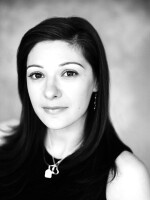Dalia Mogahed, a Muslim, is one of 25 people President Obama tapped to advise him on faith issues. She may have met the president exactly once, but to Muslims, she's a celebrity — thanks to the headscarf, or hijab, she wears every day.
When Obama spoke to the Muslim world from Egypt last summer, Mogahed was in the audience, sitting five rows from the front, sandwiched between old men in prayer caps and women in suits.
To Muslims who saw her there, she was traveling with the president — even though she wasn't. To them, she'd written his speech — even though she'd only contributed a couple of paragraphs.
To them, she was his Islamic adviser. She's not.
The denials didn't matter. The sight of Mogahed, a Muslim, in her hijab, seeming very official and "Washington," prompted Muslims to think of her as something more. To them, she is the hijabi in the White House.
"That's what stuck and that's how the story has been framed ever since. I've tried many times to reframe it and failed miserably," Mogahed says.
Muslims everywhere see her voluntary appointment as a backstage pass to the White House. She hears everything from "My father is in jail, and I want you to ask Obama to pardon him" to "I need a visa," she says.
What Mogahed actually does for the president is work on his faith-based council. They're supposed to come up with ideas on how the American government can partner with communities and social groups. What she brings to the table is research from her polling of Muslims at her day job with Gallup.
Mogahed says she's not there to represent Islam.
"What I'm doing is sharing with other council members and with the president the research we've done on the opinions of Muslims around the world," Mogahed says.
Right now, those opinions have swung sharply in favor of the United States. Mogahed saw that firsthand when she traveled around the region at the same time.
"Most people no longer questioned his sincerity but only his ability to follow through and I felt that was a very significant shift," Mogahed says.
Mogahed lives in suburban Virginia with her husband, a physician, and her two sons, who both spoke Arabic before they spoke English. That was important to her. Mogahed came to the U.S. from Egypt when she was 5 years old, and the family goes back often to visit relatives.
She studied engineering in college, and she became fascinated by the idea of applying the scientific method to the understanding of people.
Once Mogahed started working, she knew people were going to react to the way she looks.
Sofia Kluch, her colleague at Gallup, has seen it happen.
"I've visibly seen the transformation that happens with people when they have walked in with their own perception and how this is changed and shaped by this very calm, not very passionate, not advocacy-driven person," Kluch says.
Mogahed knows, though, that with all her qualifications, the sight of her in her headscarf on a political council could just be for show.
"It really doesn't matter why someone puts you on a council or a committee, but once you're on the council, you can decide whether you want to be a token or you want to be a substantive and significant member of that group," Mogahed says. "I see all those opportunities as just that — opportunities."
And all those expectations of Muslims around the world? That, she says, is something she cannot control.
Copyright 2022 NPR. To see more, visit https://www.npr.org. 9(MDAzMjM2NDYzMDEyMzc1Njk5NjAxNzY3OQ001))







